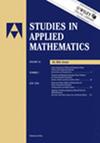具有 3×3$3 次 Lax 对的耦合 Hirota 方程:过渡带中的潘列韦型渐近线
IF 2.6
2区 数学
Q1 MATHEMATICS, APPLIED
引用次数: 0
摘要
我们考虑了具有 Lax 对的可积分耦合 Hirota 方程解的 Painlevé 渐近线,其初始数据在无限远处迅速衰减。利用黎曼-希尔伯特(RH)技术和戴夫特-周(Deift-Zhou)非线性最陡下降论证,在由 , 定义的过渡区,其中是一个常数,结果发现解的前导阶项可以用耦合 Painlevé II 方程的解来表示,该方程与矩阵 RH 问题相关,出现在各种随机矩阵模型中。本文章由计算机程序翻译,如有差异,请以英文原文为准。
The coupled Hirota equations with a
3
×
3
$3\times 3$
Lax pair: Painlevé-type asymptotics in transition zone
We consider the Painlevé asymptotics for a solution of the integrable coupled Hirota equations with a Lax pair whose initial data decay rapidly at infinity. Using the Riemann–Hilbert (RH) techniques and Deift–Zhou nonlinear steepest descent arguments, in a transition zone defined by , where is a constant, it turns out that the leading-order term to the solution can be expressed in terms of the solution of a coupled Painlevé II equations, which are associated with a matrix RH problem and appear in a variety of random matrix models.
求助全文
通过发布文献求助,成功后即可免费获取论文全文。
去求助
来源期刊

Studies in Applied Mathematics
数学-应用数学
CiteScore
4.30
自引率
3.70%
发文量
66
审稿时长
>12 weeks
期刊介绍:
Studies in Applied Mathematics explores the interplay between mathematics and the applied disciplines. It publishes papers that advance the understanding of physical processes, or develop new mathematical techniques applicable to physical and real-world problems. Its main themes include (but are not limited to) nonlinear phenomena, mathematical modeling, integrable systems, asymptotic analysis, inverse problems, numerical analysis, dynamical systems, scientific computing and applications to areas such as fluid mechanics, mathematical biology, and optics.
 求助内容:
求助内容: 应助结果提醒方式:
应助结果提醒方式:


